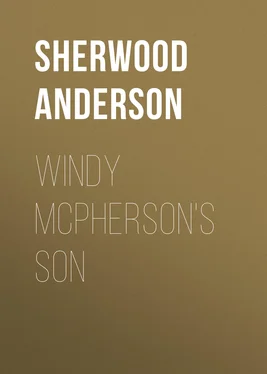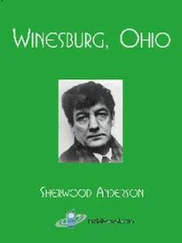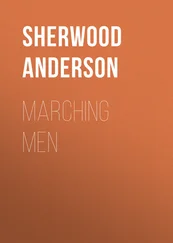Sherwood Anderson - Windy McPherson's Son
Здесь есть возможность читать онлайн «Sherwood Anderson - Windy McPherson's Son» — ознакомительный отрывок электронной книги совершенно бесплатно, а после прочтения отрывка купить полную версию. В некоторых случаях можно слушать аудио, скачать через торрент в формате fb2 и присутствует краткое содержание. Издательство: Иностранный паблик, Жанр: foreign_prose, literature_20, foreign_antique, на английском языке. Описание произведения, (предисловие) а так же отзывы посетителей доступны на портале библиотеки ЛибКат.
- Название:Windy McPherson's Son
- Автор:
- Издательство:Иностранный паблик
- Жанр:
- Год:неизвестен
- ISBN:нет данных
- Рейтинг книги:5 / 5. Голосов: 1
-
Избранное:Добавить в избранное
- Отзывы:
-
Ваша оценка:
- 100
- 1
- 2
- 3
- 4
- 5
Windy McPherson's Son: краткое содержание, описание и аннотация
Предлагаем к чтению аннотацию, описание, краткое содержание или предисловие (зависит от того, что написал сам автор книги «Windy McPherson's Son»). Если вы не нашли необходимую информацию о книге — напишите в комментариях, мы постараемся отыскать её.
Windy McPherson's Son — читать онлайн ознакомительный отрывок
Ниже представлен текст книги, разбитый по страницам. Система сохранения места последней прочитанной страницы, позволяет с удобством читать онлайн бесплатно книгу «Windy McPherson's Son», без необходимости каждый раз заново искать на чём Вы остановились. Поставьте закладку, и сможете в любой момент перейти на страницу, на которой закончили чтение.
Интервал:
Закладка:
“I will try,” he stammered, “I will try to be a man. I will try to not have anything to do with them—with women. I will work and make money—and—and–”
Speech left him. He rolled over and lying on his stomach looked at the ground.
“To Hell with women and girls,” he burst forth as though throwing something distasteful out of his throat.
In the road a clamour arose. The dogs, giving up the pursuit of rabbits, came barking and growling into sight and scampered up the grassy bank, covering the man and the boy. Shaking off the reaction upon his sensitive nature of the emotions of the boy Telfer arose. His sang froid had returned to him. Cutting right and left with his stick at the dogs he cried joyfully, “We have had enough of eloquence from man, boy, and dog. We will be on our way. We will get this boy Sam home and tucked into bed.”
CHAPTER V
Sam was a half-grown man of fifteen when the call of the city came to him. For six years he had been upon the streets. He had seen the sun come up hot and red over the corn fields, and had stumbled through the streets in the bleak darkness of winter mornings, when the trains from the north came into Caxton covered with ice, and the trainmen stood on the deserted little platform whipping their arms and calling to Jerry Donlin to hurry with his work that they might get back into the warm stale air of the smoking car.
In the six years the boy had grown more and more determined to become a man of money. Fed by banker Walker, the silent mother, and in some subtle way by the very air he breathed, the belief within him that to make money and to have money would in some way make up for the old half-forgotten humiliations in the life of the McPherson family and would set it on a more secure foundation than the wobbly Windy had provided, grew and influenced his thoughts and his acts. Tirelessly he kept at his efforts to get ahead. In his bed at night he dreamed of dollars. Jane McPherson had herself a passion for frugality. In spite of Windy’s incompetence and her own growing ill health, she would not permit the family to go into debt, and although, in the long hard winters, Sam sometimes ate cornmeal mush until his mind revolted at the thought of a corn field, yet was the rent of the little house paid on the scratch, and her boy fairly driven to increase the totals in the yellow bankbook. Even Valmore, who since the death of his wife had lived in a loft above his shop and who was a blacksmith of the old days, a workman first and a money maker later, did not despise the thought of gain.
“It is money makes the mare go,” he said with a kind of reverence as banker Walker, fat, sleek, and prosperous, walked pompously out of Wildman’s grocery.
Of John Telfer’s attitude toward money-making, the boy was uncertain. The man followed with joyous abandonment the impulse of the moment.
“That’s right,” he cried impatiently when Sam, who had begun to express opinions at the gatherings in the grocery, pointed out hesitatingly that the papers took account of men of wealth no matter what their achievements, “Make money! Cheat! Lie! Be one of the men of the big world! Get your name up for a modern, high-class American!”
And in the next breath, turning upon Freedom Smith who had begun to berate the boy for not sticking to the schools and who predicted that the day would come when Sam would regret his lack of book learning, he shouted, “Let the schools go! They are but musty beds in which old clerkliness lies asleep!”
Among the travelling men who came to Caxton to sell goods, the boy, who had continued the paper selling even after attaining the stature of a man, was a favourite. Sitting in chairs before the New Leland House they talked to him of the city and of the money to be made there.
“It is the place for a live young man,” they said.
Sam had a talent for drawing people into talk of themselves and of their affairs and began to cultivate travelling men. From them, he got into his nostrils a whiff of the city and, listening to them, he saw the great ways filled with hurrying people, the tall buildings touching the sky, the men running about intent upon money-making, and the clerks going on year after year on small salaries getting nowhere, a part of, and yet not understanding, the impulses and motives of the enterprises that supported them.
In this picture Sam thought he saw a place for himself. He conceived of life in the city as a great game in which he believed he could play a sterling part. Had he not in Caxton brought something out of nothing, had he not systematised and monopolised the selling of papers, had he not introduced the vending of popcorn and peanuts from baskets to the Saturday night crowds? Already boys went out in his employ, already the totals in the bank book had crept to more than seven hundred dollars. He felt within him a glow of pride at the thought of what he had done and would do.
“I will be richer than any man in town here,” he declared in his pride. “I will be richer than Ed Walker.”
Saturday night was the great night in Caxton life. For it the clerks in the stores prepared, for it Sam sent forth his peanut and popcorn venders, for it Art Sherman rolled up his sleeves and put the glasses close by the beer tap under the bar, and for it the mechanics, the farmers, and the labourers dressed in their Sunday best and came forth to mingle with their fellows. On Main Street crowds packed the stores, the sidewalks, and drinking places, and men stood about in groups talking while young girls with their lovers walked up and down. In the hall over Geiger’s drug store a dance went on and the voice of the caller-off rose above the clatter of voices and the stamping of horses in the street. Now and then a fight broke out among the roisterers in Piety Hollow. Once a young farm hand was killed with a knife.
In and out through the crowd Sam went, pressing his wares.
“Remember the long quiet Sunday afternoon,” he said, pushing a paper into the hands of a slow-thinking farmer. “Recipes for cooking new dishes,” he urged to the farmer’s wife. “There is a page of new fashions in dress,” he told the young girl.
Not until the last light was out in the last saloon in Piety Hollow, and the last roisterer had driven off into the darkness carrying a Saturday paper in his pocket, did Sam close the day’s business.
And it was on a Saturday night that he decided to drop paper selling.
“I will take you into business with me,” announced Freedom Smith, stopping him as he hurried by. “You are getting too old to sell papers and you know too much.”
Sam, still intent upon the money to be made on that particular Saturday night, did not stop to discuss the matter with Freedom, but for a year he had been looking quietly about for something to go into and now he nodded his head as he hurried away.
“It is the end of romance,” shouted Telfer, who stood beside Freedom Smith before Geiger’s drug store and who had heard the offer. “A boy, who has seen the secret workings of my mind, who has heard me spout Poe and Browning, will become a merchant, dealing in stinking hides. I am overcome by the thought.”
The next day, sitting in the garden back of his house, Telfer talked to Sam of the matter at length.
“For you, my boy, I put the matter of money in the first place,” he declared, leaning back in his chair, smoking a cigarette and from time to time tapping Eleanor on the shoulder with his cane. “For any boy I put money-making in the first place. It is only women and fools who despise money-making. Look at Eleanor here. The time and thought she puts into the selling of hats would be the death of me, but it has been the making of her. See how fine and purposeful she has become. Without the millinery business she would be a purposeless fool intent upon clothes and with it she is all a woman should be. It is like a child to her.”
Читать дальшеИнтервал:
Закладка:
Похожие книги на «Windy McPherson's Son»
Представляем Вашему вниманию похожие книги на «Windy McPherson's Son» списком для выбора. Мы отобрали схожую по названию и смыслу литературу в надежде предоставить читателям больше вариантов отыскать новые, интересные, ещё непрочитанные произведения.
Обсуждение, отзывы о книге «Windy McPherson's Son» и просто собственные мнения читателей. Оставьте ваши комментарии, напишите, что Вы думаете о произведении, его смысле или главных героях. Укажите что конкретно понравилось, а что нет, и почему Вы так считаете.












